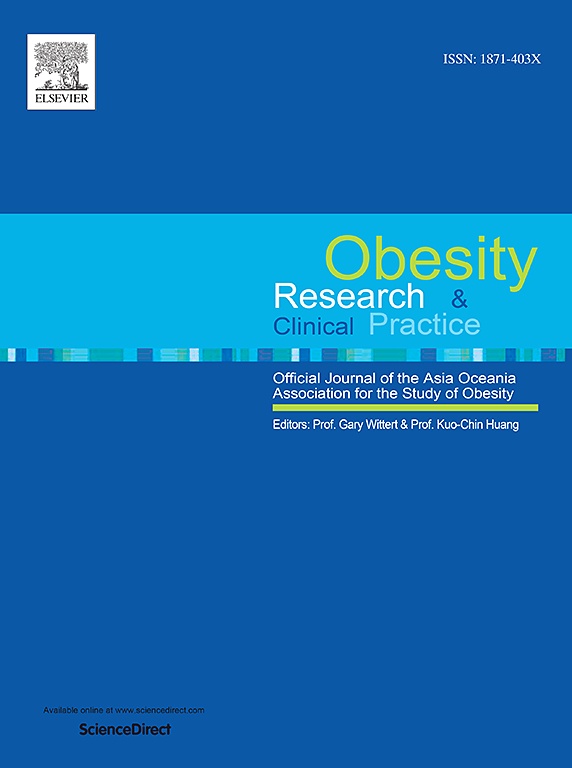Abnormal body mass index is associated with risk of multiple sclerosis: A systematic review and meta-analysis
IF 2.5
4区 医学
Q3 ENDOCRINOLOGY & METABOLISM
引用次数: 0
Abstract
Background
It is widely recognized that obesity is characterized by a chronic low-grade inflammatory condition. In the context of childhood and adolescent obesity, there is also a noteworthy correlation with elevated levels of inflammatory markers. These markers signify a proinflammatory state that may have relevance to the development of MS. We aim to comprehensively explore the relationship between childhood, adolescent, and adulthood obesity and the risk of developing multiple sclerosis (MS).
Method
We performed a comprehensive systematic review and meta-analysis of relevant literature through online search in databases like MEDLINE, Scopus, EMBASE, and Web of Science. We included studies that 1) provided information on multiple body mass index (BMI) categories before the onset of MS (Pre-MS BMI) and 2) had a healthy control group.
Result
The overall risk ratio (RR) in underweight people is 0.96 (95 % CI: 0.85 to 1.09, I2 = 0 %), indicating no significant impact on MS risk. Individuals who are overweight or obese, on the other hand, were at a higher risk of MS, with RRs of 1.38 (95 % CI: 1.27 to 1.49, I2 = 49 %) and 1.88 (95 % CI: 1.50 to 2.35, I2 = 76 %), respectively. There is a significantly greater risk of MS for people who are obese than for those who are overweight.
Conclusion
Overweight and obese individuals are at increased risk for MS, emphasizing the significance of weight status in MS susceptibility. Our findings support the hypothesis that obesity-related mechanisms—such as chronic inflammation, immune responses, and changes in gut microbiota and adipokines—may play a role in this association.
异常体重指数与多发性硬化症风险相关:一项系统回顾和荟萃分析。
背景:人们普遍认为肥胖是一种慢性低度炎症。在儿童和青少年肥胖的背景下,炎症标志物水平升高也有显著的相关性。这些标志物表明促炎状态可能与多发性硬化症的发展有关。我们旨在全面探索儿童、青少年和成年期肥胖与多发性硬化症(MS)发展风险之间的关系。方法:通过在线检索MEDLINE、Scopus、EMBASE、Web of Science等数据库,对相关文献进行综合系统综述和meta分析。我们纳入了以下研究:1)提供多发性硬化症发病前的多种身体质量指数(BMI)类别信息(Pre-MS BMI); 2)有健康对照组。结果:体重过轻者的总体风险比(RR)为0.96 (95% CI: 0.85 ~ 1.09, I2 = 0%),对MS风险无显著影响。另一方面,超重或肥胖的个体患多发性硬化症的风险更高,相对危险度分别为1.38 (95% CI: 1.27至1.49,I2 = 49%)和1.88 (95% CI: 1.50至2.35,I2 = 76%)。肥胖的人患多发性硬化症的风险明显高于超重的人。结论:超重和肥胖个体发生MS的风险增加,强调了体重状况在MS易感性中的重要性。我们的研究结果支持了肥胖相关机制——如慢性炎症、免疫反应、肠道微生物群和脂肪因子的变化——可能在这种关联中发挥作用的假设。
本文章由计算机程序翻译,如有差异,请以英文原文为准。
求助全文
约1分钟内获得全文
求助全文
来源期刊

Obesity research & clinical practice
医学-内分泌学与代谢
CiteScore
7.10
自引率
0.00%
发文量
80
审稿时长
49 days
期刊介绍:
The aim of Obesity Research & Clinical Practice (ORCP) is to publish high quality clinical and basic research relating to the epidemiology, mechanism, complications and treatment of obesity and the complication of obesity. Studies relating to the Asia Oceania region are particularly welcome, given the increasing burden of obesity in Asia Pacific, compounded by specific regional population-based and genetic issues, and the devastating personal and economic consequences. The journal aims to expose health care practitioners, clinical researchers, basic scientists, epidemiologists, and public health officials in the region to all areas of obesity research and practice. In addition to original research the ORCP publishes reviews, patient reports, short communications, and letters to the editor (including comments on published papers). The proceedings and abstracts of the Annual Meeting of the Asia Oceania Association for the Study of Obesity is published as a supplement each year.
 求助内容:
求助内容: 应助结果提醒方式:
应助结果提醒方式:


